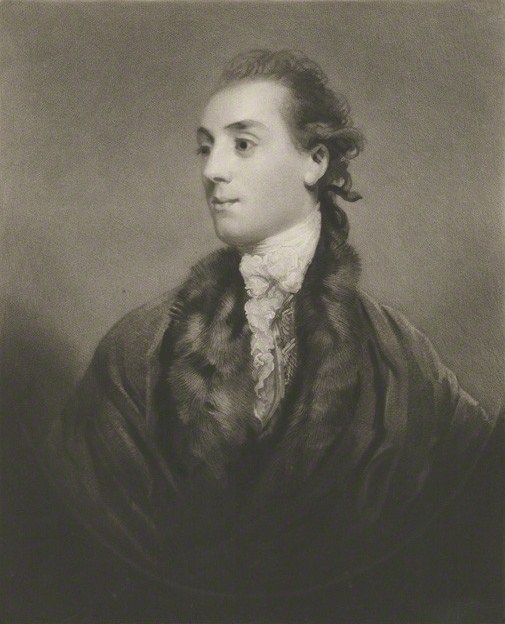James Hare (1747-1804) on:
[Wikipedia]
[Google]
[Amazon]
James Hare (1747–1804) was an English politician, diplomat and wit.


Life
He was the son of Joseph Hare, an apothecary ofWells, Somerset
Wells () is a cathedral city and civil parish in the Mendip district of Somerset, located on the southern edge of the Mendip Hills, south-east of Weston-super-Mare, south-west of Bath and south of Bristol. Although the population recorde ...
. He was educated at Eton College, and entered King's College, Cambridge in December 1765. He graduated B.A. in 1770, having become a fellow in 1768, a position he held to 1774.
Hare entered London life, where his status as a wit was generally recognised. Georgiana Cavendish, Duchess of Devonshire described Hare as having "a manner of placing every object in so new a light that his kind of wit always surprises as much as it pleases." He associated with the fashionable set of Frederick Howard, 5th Earl of Carlisle, Earl Fitzwilliam, General Richard FitzPatrick, Charles James Fox, and Anthony Morris Storer. He sat for the borough of , in Hampshire, from May 1772 to 1774, and then for , a constituency controlled by the Duke of Devonshire
Duke of Devonshire is a title in the Peerage of England held by members of the Cavendish family. This (now the senior) branch of the Cavendish family has been one of the wealthiest British aristocratic families since the 16th century and has be ...
, from 3 July 1781 until his death in 1804. He broke down in his maiden parliamentary speech, and never made a second attempt.
One of the few trustworthy and discreet members of the Ton (le bon ton)
The ''ton'' was the high society in the United Kingdom during the late Regency era and the reign of King George IV, and later. The word means, in this context, "manners" or "style" and is pronounced as in French (). The full phrase is ''le bon t ...
, Hare was a loyal, kind friend to Georgiana Cavendish, Duchess of Devonshire to his death. For example, Hare had several illegitimate children of his own, and was sympathetic to the plight of Georgiana's friend Lady Elizabeth Foster
Elizabeth Christiana Cavendish, Duchess of Devonshire (13 May 1758 – 30 March 1824) was an English aristocrat and letter writer. She is best known as Lady Elizabeth Foster, the close friend of Georgiana Cavendish, Duchess of Devonshire. Eliza ...
's illegitimate children; he went out of his way to check on Foster's illegitimate children in France in the midst of the French Revolution. Hare brushed off his kindness, writing to Foster, "The constant anxiety which I feel for my own children would of itself sufficiently dispose me to assist almost anybody when children are concerned." He helped convince Georgiana to allow Foster's illegitimate daughter Caroline St. Jules to publicly become a member of the family by allowing her to live at Devonshire House.
Of his physical appearance, he was "stick-thin, with a face so white he appeared more dead than alive."
Hare was a gambling addict, and he was always in debt. His seat in Parliament —courtesy of the Duke of Devonshire— was the only reason he was not sent to debtors' prison. While his grandfather was a bishop, his father was a mere apothecary. Hare had gambled away his small inheritance and thereafter remained dependent on his rich Whig friends as a house guest.
From October 1779 to January 1782 he was minister plenipotentiary in Poland.
In 1802 he was very ill in Paris, and Fox paid him frequent visits. After taking a stroll with Georgiana's mother Georgiana Spencer, Countess Spencer
Margaret Georgiana Spencer, Countess Spencer (''née'' Poyntz; 8 May 1737 – 18 March 1814), was an English philanthropist. She was born at St James's Palace as the daughter of a diplomat and a maid of honour to Caroline of Ansbach. In 1754, she ...
, he caught a head-cold that turned into pneumonia; he died at Bath, Somerset
Bath () is a city in the Bath and North East Somerset unitary area in the county of Somerset, England, known for and named after its Roman-built baths. At the 2021 Census, the population was 101,557. Bath is in the valley of the River Avon, ...
10 March 1804. Hare was greatly mourned by his friends, including Georgiana, the Duke of Devonshire, and Bess Foster.''The Duchess'' by Amanda Foreman, page 354
Works
Hare was believed to have been one of the writers of the ''Rolliad
The ''Rolliad'', in full ''Criticisms on the Rolliad'', is a work of British satire directed principally at the administration of William Pitt the Younger. It was written and originally published in serial form in the ''Morning Herald'' in 1784‚ ...
''.
Family
Hare's fortune was improved by his marriage at St. George's, Hanover Square, London, on 21 January 1774, to Hannah, only daughter ofSir Abraham Hume, 1st Baronet
Sir Abraham Hume, 1st Baronet (1703 – 10 October 1772) was a British businessman and MP.
He was the fourth son of Robert Home (subsequently Hume) of Ayton, Berwick.
Hume was a Principal Managing Owner for groups which built ships and hired t ...
. She died 6 May 1827, and a monument to her memory was placed in the chancel of Wormley Church, Hertfordshire. They had one daughter.
Notes
;Attribution {{DEFAULTSORT:Hare, James 1747 births 1804 deaths People educated at Eton College Members of the Parliament of Great Britain for English constituencies Members of the Parliament of the United Kingdom for English constituencies Fellows of King's College, Cambridge British MPs 1768–1774 British MPs 1780–1784 British MPs 1784–1790 British MPs 1790–1796 British MPs 1796–1800 UK MPs 1801–1802 UK MPs 1802–1806 People from Wells, Somerset